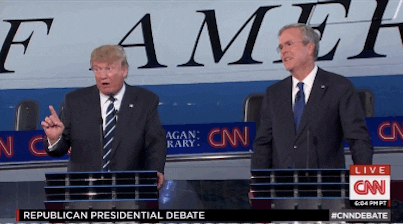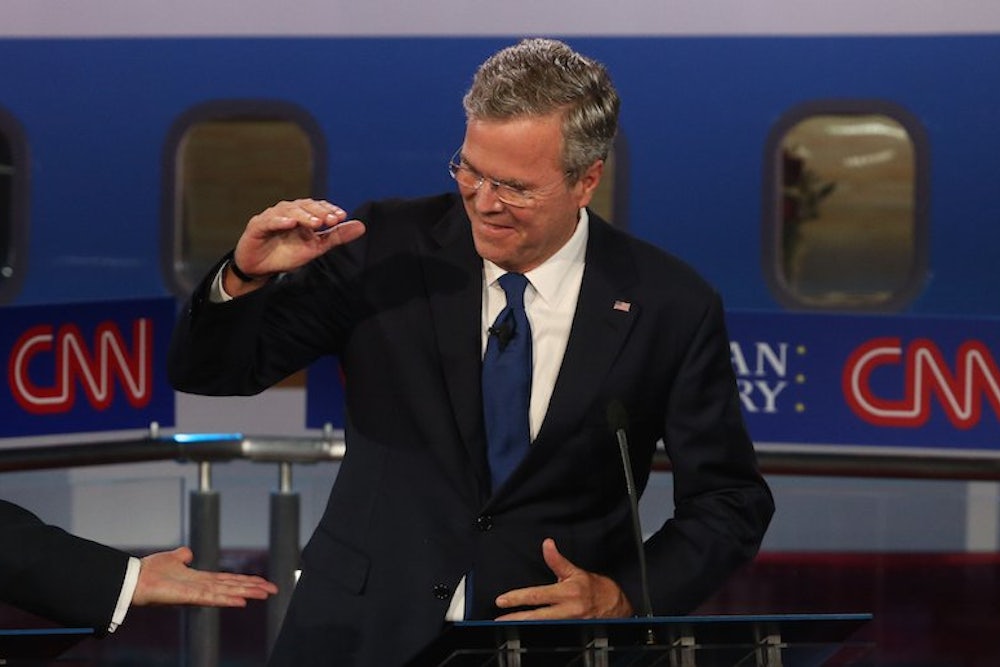We won’t know whether the second GOP presidential debate had a meaningful impact on the primary campaign for several days, when a fresh set of polls captures its impact on public opinion. But it seemed to reveal something that should alarm Republicans: In addition to the fact that they have no obvious candidate to consolidate behind, the fractured field is leaving each favored contender vulnerable to other dark horses who are happy to maul and obstruct them.
As I wrote in advance of the debate, the biggest immediate threat to the GOP is a collective-action problem that enticed at least four establishment-favored candidates into the race, without a mechanism or incentive to drive any of them back out. As a result, all of them are languishing with the support of less than 10 percent of the Republican electorate. This leaves nobody with any real party backing to stand as an equal, or near equal to Donald Trump, and allows candidates who should be insurgents and also-rans, like Ted Cruz and Mike Huckabee, to compete as peers with just as much popular backing.
The biggest victim of this phenomenon is Jeb Bush, who not only has to fend off minor threats, but is also engaged in a clearly unwinnable rhetorical war with Trump. The Bush family excels at political dirty tricks, blessing operatives who circulate lies and innuendo about their opponents. But Jeb, at least, has no facility for the direct verbal pugilism politics often requires.

Over and over again during the debate, Bush attempted to assert himself against Trump, as if to demonstrate by example that Trump has mischaracterized his lack of vigor. He failed every time. At one point, Trump took note of Bush’s determination to set the record straight, by dismissing him out of hand—“More energy tonight, I like that!”—before steamrolling Bush, who looked on dumbfounded. When Bush demanded Trump apologize to his wife, Trump refused, and Bush relented. When Trump attacked George W. Bush's decision to go to war, Jeb fell back on a popular Republican canard—that his brother "kept us safe"—before referencing the rubble of the World Trade Center where thousands of people died. Though the audience responded well, Trump was unfazed, "I don't feel that safe. Do you?" This pattern repeated itself throughout the debate, until its last moments, when Bush resigned himself to his role, and agreeably slapped five at Trump's outstretched hand.
The problem for the GOP is that anyone concerned Bush might not be suited to the campaign can’t pivot to an alternative with much confidence, because other establishmentarians keep getting rolled as well.
Whenever he gets a moment to speak, Ohio Governor John Kasich usually proves he’s the most clear-minded of the supposedly viable candidates on stage. But when tried to inject some reason and sobriety into the debate, by pointing out how reckless it would be for the next president to damage our strongest alliances by breaching the nuclear agreement with Iran, Ted Cruz and Carly Fiorina swarmed him, with deftly delivered but dangerous insistences that multilateral agreements like the Iran agreement can and should be shredded as a first order of presidential business.
Wisconsin Governor Scott Walker, whose support in Iowa and elsewhere collapsed in recent weeks, has decided that the key to rehabilitating his campaign is to grasp for impracticable right-wing policies, while simultaneously mounting attacks against Trump. In addition to appearing desperate, he fared no better than Bush against Trump, who mowed him over with a sustained assault on Walker’s management of Wisconsin’s budget.
The one exception, and perhaps the GOP’s greatest source of hope, is Senator Marco Rubio, who has avoided combat not just with Trump but with the rest of the field, too. But that raises the question of how he’ll fare when the combat finds him, as it inevitably will.
The only candidate who managed to mix it up with others, including Trump, and not end up debased by the confrontation, was Carly Fiorina—another outsider who, like Trump, and Ben Carson, has never held elected office.
For candidates like her, and Cruz, and others outside the immediate good graces of the establishment, the hidden value of Trump’s persistence is that he’s making Republican elites desperate for anyone else to supersede him. The hope was that, eventually, it would be Bush. Or Rubio. Or Walker. Or Kasich.
After this debate it’s no clearer that any of them will ever get a chance.
